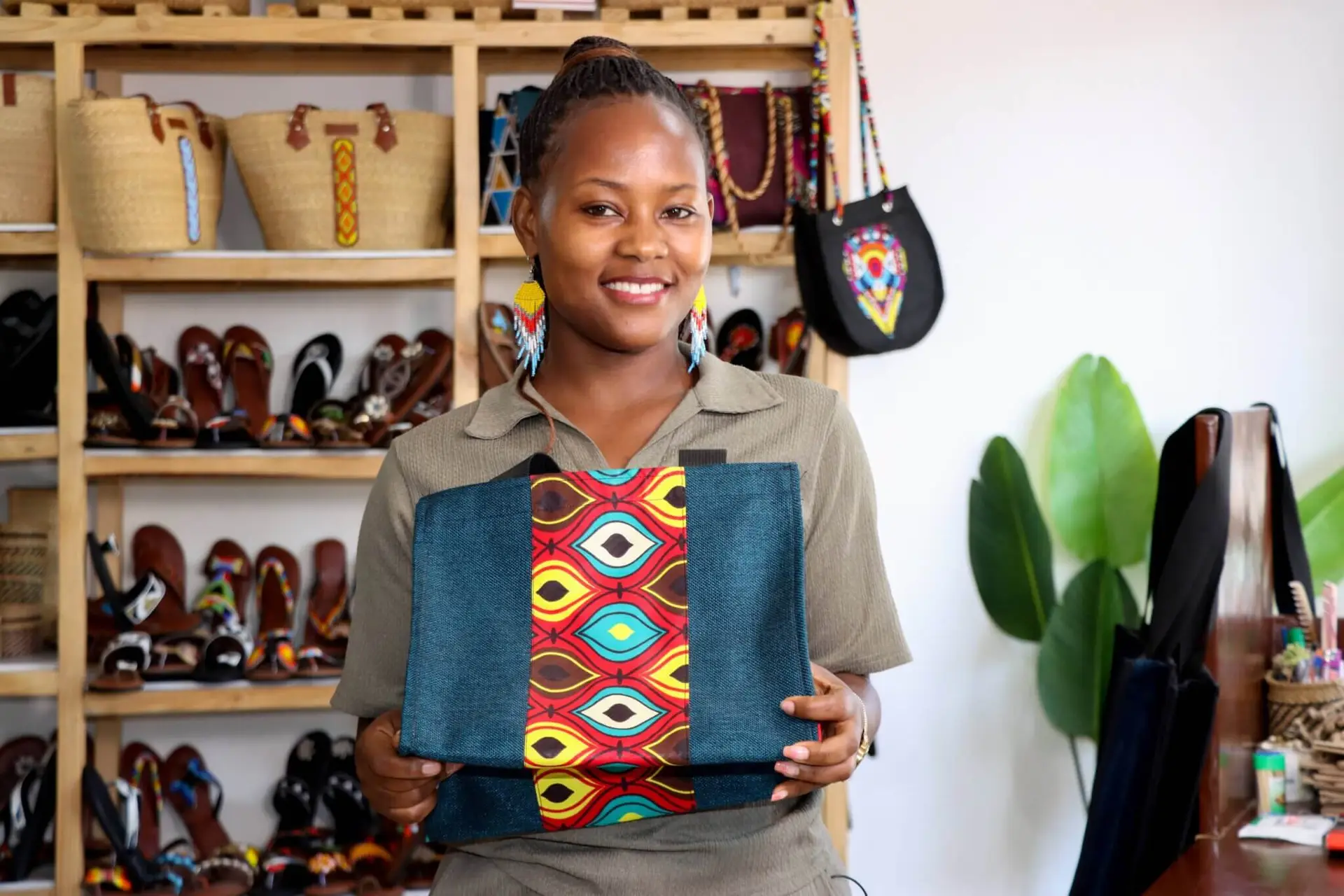Getruda Mushi CEO of Muge Africart holding on of her products.
In Tanzania, where informal trade is widespread and access to markets and finance remains patchy, digital tools are beginning to reshape how small businesses operate. Platforms like iSOKO, a digital platform developed by TMA with support from Global Affairs Canada, help bridge the gap, connecting sellers to buyers, banks, basic market intelligence, and an inventory management system.
For Ms. Getruda Mushi, who sells African fabrics, handcrafted bags, and beaded sandals under her brand Muge Africart, the platform’s greatest value was building her financial confidence. She says the platform opened doors to financial training and services and equipped her with the confidence to engage with financial institutions. With newfound financial literacy, she began making informed decisions that stabilised and grew her business. “I had a vision to own a large business, but the reality of accessing finance to run a business in a competitive market was daunting,” she recalls. “Before iSOKO, I didn’t know how to track expenses or negotiate loans,” she says. After participating in financial training sessions linked to the platform, she expanded to a larger shop. “Not even a year has passed but I have already come this far. This is a major achievement for me,” she says.
Shabani Kaoneka, a fish trader turned poultry seller, is one of nearly 90,000 users on the platform. A few years ago, her business collapsed under the weight of a bank loan she could no longer service after the 2015 elections triggered an economic downturn, she told us, as she gently lifts a large Nile perch and places it into a freezer, her hands steady. She feared borrowing from banks again, as she no longer had a steady income to service a loan. On joining the Tanzania Women Chamber of Commerce (TWCC), Ms. Kaoneka was introduced to iSOKO and started participating in their activities, including attending training seminars. Her products — tilapia, Nile perch, and chicken — are now listed on the iSOKO marketplace, in addition to supplying hotels and individual buyers. She says, “I go to the marketplace section, post my products, and buyers reach out. Some ask about prices, others request deliveries, and some come to buy directly from my outlet.” Ms. Kaoneka dreams of expanding beyond borders. “I want to sell my products in Kenya and other countries. iSOKO helps me promote my business, but I need more opportunities outside Tanzania.”
Florence Nezeyeimana, a cross-border trader from Burundi, is another beneficiary of the iSOKO platform. Before discovering iSOKO, Florence, who is based in Bujumbura, faced numerous challenges in her daily trade activities. These included a lack of clarity around tax regulations, delays at border points, and frequent issues with missing or incomplete documentation. These barriers made cross-border trade both time-consuming and costly. Since joining iSOKO, Florence has experienced a significant transformation in how she conducts her business. The platform has enabled her to connect with customers in other countries and complete transactions securely without needing to physically cross borders. This has reduced her travel expenses and minimised the risks associated with traditional trading methods. “I no longer waste time or money,” Florence says. “iSOKO has helped me plan better, sell faster, and avoid unnecessary losses. Now, I can focus on growing my business and supporting my family with confidence.”
While few traders on the platform secure loans without collateral, and most still operate within local markets, the promise of digital trade inclusion is real, and it will take coordinated investment in financial literacy, supply chain logistics, and export readiness in order to tap into regional markets. Plans are underway to scale iSOKO to accommodate more Micro, Small, and Medium Enterprises (MSMEs) across Kenya and other East African countries, ensuring it can serve a broader and more diverse user base.


